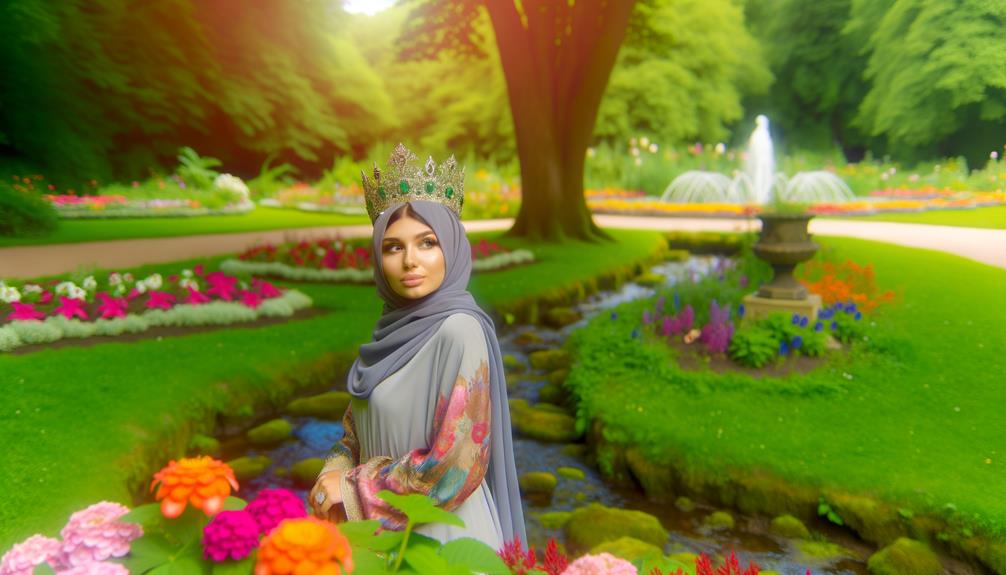Meaning of the Name Rania
Rania, an Arabic name, originates from the verb 'ra'naa,' meaning 'to gaze' or 'to look at.' It conveys a deep cultural appreciation for perception, beauty, and thoughtful observation. Historically, it has symbolized nobility and elegance, often associated with societal admiration and contemplation.
The name enjoys diverse interpretations across different cultures, from regal presence in Arabic-speaking regions to purity in Greek and elegance in South Asia. In contemporary contexts, Rania retains a blend of traditional appeal and modern charm.
Explore further to uncover its rich historical significance and global adaptability.

Key Takeaways
- Derived from Arabic, 'Rania' means 'to gaze' or 'to look at' with admiration.
- Symbolizes beauty, grace, and perceptive nature in Arabic culture.
- Historically associated with nobility, elegance, and queenly demeanor.
- Embraces cultural versatility with regal significance in Arabic regions and purity in Greek culture.
- Highlights timeless elegance and modern charm, suitable for individuals of high social standing.
Etymology and Origins
Rooted in Arabic, the name Rania originates from the verb 'ra'naa,' meaning 'to gaze' or 'to look at,' often connoting admiration and contemplation. This etymology highlights the act of observing with a sense of reverence and reflection, indicative of the cultural value placed on perception and beauty.
Historically, names derived from verbs are prevalent in Arabic, reflecting actions or states of being significant within the culture. Rania, as such, is not merely a personal identifier but a linguistic artifact embodying cultural appreciation for the act of seeing and understanding.
The name's formation through Arabic linguistic traditions underscores a rich historical tapestry, providing insights into the values and aesthetics of the societies where it is commonly used.
Arabic Significance
In the context of Arabic culture, the name Rania carries profound connotations of admiration, contemplation, and a deep appreciation for beauty and insight. Derived from the Arabic root 'ra-na,' which means 'to gaze' or 'to look at with admiration,' Rania encapsulates the essence of a person who is not only observant but also deeply reflective.
In historical and cultural settings, the name often embodies qualities such as grace, elegance, and a perceptive nature. These attributes resonate strongly in Arabic literature and poetry, where the act of gazing is often associated with profound emotional and intellectual pursuits.
Therefore, Rania is more than a name; it is a symbol of thoughtful observation and aesthetic appreciation in Arabic tradition.
Cultural Variations
Across different cultures, the name Rania embodies unique interpretations and attributes, reflecting the diverse linguistic and historical contexts in which it is found.
In Arabic-speaking regions, Rania signifies a queenly or regal presence, aligning with its etymological roots.
In Greek culture, the name is imbued with meanings associated with purity and holy grace.
Meanwhile, in South Asian contexts, especially in India and Pakistan, Rania is often linked to elegance and beauty, further enriched by local literary and cinematic influences.
Each cultural variation imbues the name with distinct yet resonant qualities, showcasing its adaptability and enduring appeal.
Therefore, Rania exemplifies the intricate interplay between language, history, and cultural identity.
Historical Context
The historical context of the name Rania reveals its deep-seated significance across various epochs and civilizations, where it has often been associated with nobility, virtue, and grace.
Originating from Arabic roots, Rania is derived from the verb 'rana,' meaning 'to gaze' or 'to look at,' symbolizing a vision or aspiration that transcends mere physical sight.
In ancient civilizations, the name was frequently bestowed upon individuals of high social standing, reflecting its connotations of regal bearing and moral rectitude.
In Persian culture, Rania was emblematic of a queenly demeanor, often linked to mythological and historical figures of power and elegance.
This rich historical backdrop underscores Rania's enduring legacy as a name imbued with cultural and ethical resonance.
Modern Usage
Today, the name Rania continues to be widely embraced, particularly in Middle Eastern and North African countries, symbolizing grace and nobility in contemporary contexts. Its usage has transcended regional boundaries, appearing in various cultural and social settings globally.
The name retains its historical connotations of queenliness and elegance, making it a preferred choice among parents seeking a name with both traditional and modern appeal. In an era where names often carry deep cultural resonances, Rania stands out for its timeless charm and distinctiveness.
It is frequently adopted in diverse forms of media, enhancing its visibility and maintaining its relevance. The name Rania remains a potent symbol of cultural heritage and modern sophistication.
Famous Bearers
The name Rania has been borne by several prominent figures, particularly Queen Rania of Jordan, who is celebrated for her philanthropic efforts and advocacy for education and women's rights.
Beyond royalty, influential women named Rania have made significant contributions in various fields, including academia, arts, and business.
These individuals not only highlight the cultural and historical significance of the name but also embody its associations with leadership and impact.
Royal Figures Named Rania
Among the most prominent bearers of the name Rania is Queen Rania of Jordan, whose influence extends across global humanitarian efforts and social initiatives. Her contributions have been pivotal in various domains:
- Educational Reform: Queen Rania has championed educational reform in Jordan, emphasizing the importance of quality education for all children.
- Women's Rights: She actively advocates for women's empowerment, working to enhance their roles in both Jordanian society and globally.
- Health Initiatives: Her work includes promoting health and wellness through various programs aimed at improving medical services and awareness.
- Global Advocacy: Queen Rania collaborates with international organizations to address issues such as poverty, refugees, and intercultural dialogue.
Her legacy exemplifies the profound impact that individuals named Rania can achieve on a royal and global scale.
Influential Women Named Rania
Beyond the royal sphere, numerous influential women named Rania have made noteworthy contributions across diverse fields such as academia, activism, and the arts. These remarkable individuals have left an indelible mark on their respective disciplines, showcasing the broad impact of women named Rania globally.
| Name | Field |
|---|---|
| Rania Masri | Environmental Activism |
| Rania Matar | Photography and Arts |
| Rania Stephan | Filmmaking |
| Rania Ezzat | Academic Research |
| Rania Elwani | Sports and Medicine |
Rania Masri, a noted environmental activist, has been instrumental in advocating for sustainable practices. Rania Matar, a Lebanese-American photographer, captures the essence of womanhood through her lens. Filmmaker Rania Stephan documents compelling narratives, while Rania Ezzat contributes significantly to academic research. Finally, Rania Elwani, an Olympic swimmer, now excels in medicine.
Popularity Trends
In recent decades, the name Rania has experienced fluctuating popularity across different cultural and geographic regions. Historically, its usage has been influenced by several factors, including socio-political events and media representation.
Significantly, the name's appeal can be traced through various trends:
- Middle Eastern Influence: The name Rania saw a rise in popularity in Arab countries, boosted by prominent figures such as Queen Rania of Jordan.
- Western Adoption: In Western cultures, the name gained some traction due to its exotic and royal connotations.
- Cultural Exchange: Globalization has facilitated the spread of the name Rania beyond its traditional boundaries.
- Media Representation: Films, television shows, and literature featuring characters named Rania have contributed to its periodic surges in popularity.
These trends highlight the dynamic nature of the name Rania's popularity.
Nicknames and Variants
The name Rania, rich in cultural heritage, offers several nicknames and variants that reflect its diverse linguistic and regional adaptations.
Commonly used nicknames include Rani, Raniah, and Ran. These diminutives provide an affectionate familiarity while retaining the name's original charm.
Variants of Rania are evident across different cultures. In Arabic, 'Raniah' often appears as an alternative spelling. In South Asian contexts, 'Rani,' meaning queen, is frequently used, highlighting the name's regal connotations. The Greek variation, 'Irini,' meaning peace, also shows the name's adaptability.
Each variant and nickname not only preserves the essence of Rania but also demonstrates its capacity to cross cultural and linguistic boundaries, embodying a name that is both timeless and versatile.
Naming Considerations
Considering the rich tapestry of nicknames and variants, selecting the name Rania involves evaluating its cultural significance, phonetic appeal, and familial resonance.
Rania, with its Arabic origins meaning 'queen' or 'gazing,' carries profound cultural depth, often symbolizing nobility and grace.
When contemplating naming a child Rania, several factors merit consideration:
- Cultural Relevance: Confirm the name aligns with your cultural heritage and traditions.
- Phonetic Elegance: Assess the name's ease of pronunciation and melodic quality.
- Historical Context: Take into account historical figures or events associated with the name.
- Family Significance: Reflect upon the name's emotional and familial connections.
Conclusion
The name Rania, steeped in unparalleled historical significance and cultural richness, transcends mere nomenclature to embody a legacy of regal and divine attributes. Its roots in Arabic etymology and its widespread cultural variations underscore its profound impact across civilizations.
Modern usage and the illustrious figures bearing the name further amplify its timeless allure. Indeed, Rania is not just a name; it is a monumental confirmation to heritage, identity, and the enduring power of linguistic tradition.






